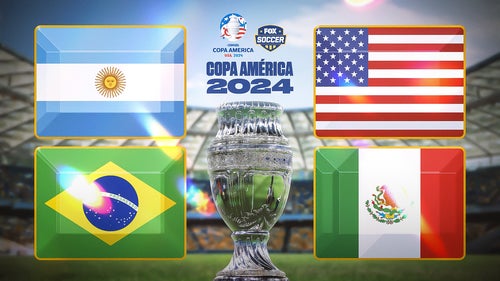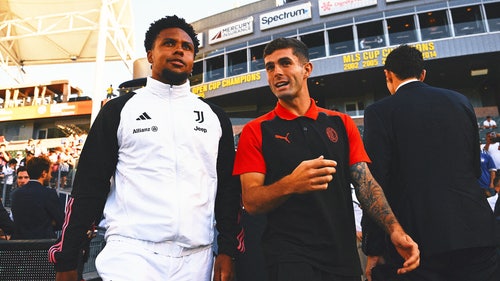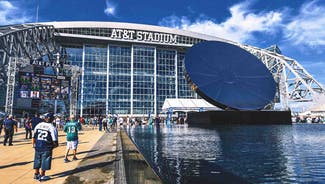
Bruce Arena is the right choice to be USMNT manager and save World Cup campaign

There are some reasons to not be thrilled by the United States' hiring of Bruce Arena as their new manager. It's a step backward, at face, going back to a man who managed you a decade ago. And he's not going to revolutionize the team. Plus, he's American, which for some reason rubs people the wrong way as the country's soccer inferiority complex never stops.
And despite all that, there is no doubt that he is the right hire for the U.S.
More than anything, the U.S. should only really be concerned with one thing right now -- qualifying for the World Cup. They are in a hole, sitting dead last in the Hex after two losses and holding a -5 goal difference. While there are still eight matches left to play and plenty of time to pull themselves into the top three, which would guarantee them a spot in the World Cup, they've nearly used up their margin for error. Historically, 16 points is needed to guarantee a spot in the World Cup so the U.S. will need to take two points-per-match, a rate that normally only the first-place team manages. Essentially, the Americans need to be the best team in the Hex the rest of the way to be comfortable about their chances of making the World Cup.
The U.S. couldn't have found someone better equipped for getting results against CONCACAF teams and qualifying than Arena. He's presided over two successful World Cup qualifying campaigns, getting the U.S. to the 2002 and 2006 tournaments, and he's won a pair of Gold Cups. Beating CONCACAF teams, especially on the road, is rarely about beautiful soccer and that's true of even the most excellent teams. Those matches are a grind and Arena has shown he's capable of setting his teams up to get those results.
Arena is a pragmatist, capable of putting men behind the ball and defending when needed, exploiting teams on the counterattack when opportune and assembling a high-powered attack when right. He will not demand a style or approach from his team and force players who don't fit it to execute it. He simply looks at his players and their skills, takes into account the opposition, and puts together tactics that marry the two.
That was on full display at the 2002 World Cup. In the Americans' three group stage matches, the team went out in a 4-4-2. In their two knockout stages matches, they played in a 3-5-2. It was the type of flexibility no other U.S. team has ever had, and beyond simply formations and personnel, his teams showed that they could keep possession and push teams deep, strike on the counterattack or even look to play direct soccer over the top. They did it across multiple formations and at the highest level.
In one tournament, Arena showed as much flexibility, tactical know-how, capable preparation and smart game-planning as we have ever seen from the U.S.
But Arena's strengths aren't limited to just tactics or preparation. He is a stupendous man manager and has drawn praise from his players for decades. After an awful 1998 World Cup in which Steve Sampson was strict with the team, Arena took over and immediately changed the culture by making things loose, with families in the hotels and traveling with the team, and trusting his players to act right. His players responded, saying that it changed the way they felt about internationals and made them excited to play for the national team again.
With the Galaxy, he was hired in the midst of a feud between David Beckham and Landon Donovan, which had essentially sunk the team. But Arena repaired that relationship from the start and both players have credited him for fixing things. Unsurprisingly, it didn't take long after for the Galaxy to become the best team in MLS and it all started with Arena's ability to handle personalities and people.
In addition to Beckham and Donovan, Steven Gerrard and Robbie Keane have praised Arena. Keane went as far as calling Arena "the Alex Ferguson in America," and much of it stems from his ability to relate to his players, listen to them and understand their concerns.
That is especially valuable to the U.S. right now. There was a growing rift between Klinsmann and the players, with the manager and his men regular contradicting each other in the media, Klinsmann repeatedly throwing his players under the bus and even captain Michael Bradley saying that the team didn't have a clear understanding of their roles in the loss to Mexico. The most important thing the Americans' incoming manager can do is rebuild the trust with the players and get them on the same page again. Nobody could do that better than Arena.
Is Arena a step back? If the team is stepping back to 2002, they will probably welcome it. He's certainly not an exciting or sexy hire, but Klinsmann was and that imploded. Arena won't revolutionize the way the U.S. plays either, but it's worth remembering that Arena's teams were the most beautiful, stylistic, attractive teams in the national team's history. Even the 2006 World Cup, undoubtedly a disappointment, was just three matches in an eight-year term and included a draw against eventual champions Italy in the only match they didn't win all tournament. And yes, he's American, but he's the best American manager ever and he's the perfect fit for a two-year term where the focus is "qualify for the World Cup" and nothing else right now.
After the 2018 World Cup, the U.S. will probably decide what they want for the future of the program, whether they need a revolution or whether a big-name foreign manager can bring some new ideas to the team. And at that time, it would be appropriate to consider such things. But that doesn't mean that Arena isn't entirely qualified for the job and the best man for it at this moment. Because he most definitely is.
MORE FROM FOX SOCCER:










































































































































